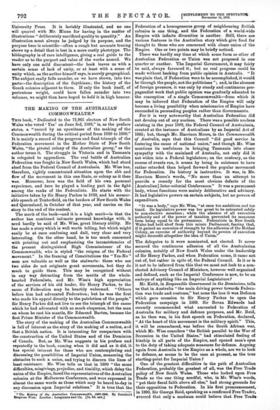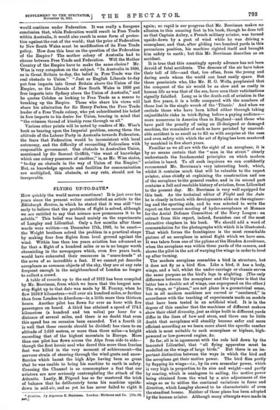THE MAKING OF THE AUSTRALIAN COMMON WEALTH.* THIS book, "
Dedicated to the 71,965 electors of New South Wales who voted Yes' on June 3rd, 1S98," is, as the preface states, a "record by an eyewitness of the making of the Commonwealth during the critical period from 1889 to 1900." It is mainly a record of the progress and final triumph of the Federation movement in the Mother State of New South Wales, "the pivotal colony of the Australian group," as the author terms it. The struggle in Victoria and in Tasmania is relegated to appendices. The real battle of Australian Federation was fought in New South Wales, which had stood aloof from the Federal Council of Australasia. Mr. Wise has, therefore, rightly concentrated attention upon the ebb and low of the movement in this one State, or colony as it then was. Moreover, here was the field of his own personal experience, and here he played a leading part in the fight among the ranks of the Federalists. He starts with the initiative taken by Sir Henry Parkes in 1889, and his memor- able speech at Tenterfield, on the borders of New South Wales and Queensland, in October of that year, and carries on the story to the end of the contest.
The merit of the book—and it is a high merit—is that the author has combined intimate personal knowledge with, it need hardly be said of Mr. Wise, great literary ability. He has made a story which is well worth telling, but which might easily be at once confusing and dull, very clear and very interesting. On the other hand, he is too much concerned with pointing out and emphasizing the inconsistencies of the present distinguished High Commissioner of the Commonwealth, who is styled "the enigma of the Federal movement." In the framing of Constitutions the " Yes-No " men are valuable as well as the stalwarts: those who see two sides do not originate great movements, but they do much to guide them. This may be recognized without in any way detracting from the merits of the whole- hearted Federalists, and Mr. Wise's high appreciation of the services of his old leader, Sir Henry Parkes, to the cause of Federation may be heartily welcomed. "Others before him had advocated Federation; but be was the first who made his appeal directly to the patriotism of the people." Sir Henry Parkes did not live to see the triumph of the cause which be had advocated with so much eloquence, but the man on whom he cast his mantle, Sir Edmund Barton, became the first Prime Minister of the Commonwealth.
The story of the making of the Australian Commonwealth is full of interest as the story of the making of a nation, and that a British nation. It is interesting for comparison with the construction of the United States and of the Dominion of Canada. But, as Mr. Wise suggests in his preface and repeatedly in the book, coming when it did and as it did, it has special interest for those who are contemplating and discussing the possibilities of Imperial Union, measuring the obstacles to such a union, and trying to discern the lines of least resistance. Mr. Wise tells us that in 1890 " the same difficulties, misgivings, prejudice, and timidity, which delay the union of the Empire, faced the representatives of the Australian colonies at the Melbourne Conference, and were expressed in almost the same words as those which may be heard to-day in any discussion upon Imperial relations." It is true that the
• The Making of the Australian Commonwealth, 1889-1900. By Bernhard Bingrose Wise. London ; Longman and Co. [7s. 6d. att.]
Federation of a homogeneous group of neighbouring British colonies is one thing, and the Federation of a world-wide Empire with infinite diversities is another. Still, there are various features in the Australian story which give food for thought to those who are concerned with closer union of the Empire. One or two points may be briefly noticed.
There was hardly any time at which some form or other of Australian Federation or Union was not proposed in one quarter or another. The Imperial Government, it may fairly be said, always favoured it ; but no real progress could be made without backing from public opinion in Australia. " It was plain that, if Federation were to be accomplished, it would be through the people, not the politicians " ; and, in the absence of foreign pressure, it was only by steady and continuous pro- pagandist work that public opinion was gradually educated to the conception of a single Commonwealth—from which it may be inferred that Federation of the Empire will only become a living possibility when missionaries of Empire have succeeded in persuading peoples rather than Governments. For it is very noteworthy that Australian Federation did not develop out of any nucleus. There was a possible nucleus existing in the year 1889, the Federal Council of Australasia, created at the instance of Australians by an Imperial Act of 1885; but, though Mr. Harrison Moore, in the Commonwealth of Australia, says that this Council "did good service in fostering the cause of national union," and though Mr. Wise mentions its usefulness in bringing Tasmania into closer sympathy with the mainland of Australia, not only did it not widen into a Federal legislature; on the contrary, as the course of events ran, it seems by being in existence to have rather retarded than helped forward the popular movement for Federation. Its history is instructive. It was, in Mr. Harrison Moore's words, " No more than an attempt to provide a remedy for the most obvious defects of the [Australian] Inter-colonial Conferences." It was a permanent body, whose functions were mainly deliberative and advisory.
It had legislative powers on certain subjects, but no powers of expenditure.
"It was a body," says Mr. Wise, "at once too ambitious and too timid. Its legislative power was too great to be entrusted safely to non-elective members ; while the absence of all executive authority and of the power of taxation prevented its measures from being equal to its pretensions. Federalists in New South Wales had held aloof from this mimic Parliament, fearing that, if it gained an accession of strength by the adhesion of the Mother Colony, an exercise of authority beyond its powers of execution might discredit altogether the idea of Union."
The delegates to it were nominated, not elected. It never secured the continuous adhesion of all the Australasian colonies, notably of New South Wales under the leadership
of Sir Henry Parkes, and when Federation came, it came not out of, but rather in spite of, the Federal Council. Is it or is it not to be inferred from this that we must not look to a non- elected Advisory Council of Ministers, however well organized and defined, such as the Imperial Conference is now, to be an embryo of anything like an Imperial Legislature ?
Mr. Keith, in Responsible Government in the Dominions, tells us that in Australia " the main driving power towards Federa- tion was trade and customs," but none the less it was Defence which gave occasion to Sir Henry Parkes to open the Federation campaign in 1889. Sir Bevan Edwards had recently recommended what amounted to Federation of Australia for military and defence purposes, and Mr. Reid, as he then was, in his first speech on Federation, declared, "At the heart of this movement is the military spirit." This, it will be remembered, was before the South African war, which Mr. Wise considers "the British parallel to the War of Secession in the United States," had stimulated feeling of kinship in all parts of the Empire, and opened men's eyes to the duty of taking adequate measures for defence. Arguing again from Australia to the Empire as a whole, are we to look to defence, as seems to be the case at present, as the true starting-point for Imperial Union ?
One of the greatest difficulties in the path of Australian Federation, probably the greatest of all, was the Free Trade policy of New South Wales. Those who looked upon Free Trade as the one thing needful, who, in Mr. Wise's words, " put their fiscal faith above all else," had strong grounds for their opposition to Federation. In his first pronouncement, in 1890, Sir George Reid, speaking as a confirmed Free Trader, averred that only a madman could believe that Free Trade would continue under Federation. It was really a foregone conclusion that, while Federation would result in Free Trade within Australia, it would also result in some form of protec- tion against the rest of the world; that the price of Federation to New South Wales must be modification of its Free Trade policy. How does this bear on the question of the Federation of the Empire P The mother colony of Australia had to choose between Free Trade and Federation. Will the Mother Country of the Empire have to make the same choice? Mr. Wise is very outspoken on the subject. " In Australia in 1890, as in Great Britain to-day, the belief in Free Trade was the real obstacle to Union." "Just as English Liberals to-day put free imports into Great Britain above the Union of the Empire, so the Liberals of New South Wales in 1890 put free imports into Sydney above the Union of Australia," and he quotes Cobden as looking to Free Trade as a means to breaking up the Empire. Those who share his views will share his admiration for Sir Henry Parkes, the Free Trade leader of a Free Trade colony, who yet subordinated his belief in free imports to his desire for Union, bearing in mind that "the crimson thread of kinship runs through us all."
Various other points will be noted by readers of Mr. Wise's book as bearing upon the Imperial problem, among them the attitude of the Labour Party in Australia towards Federation, the fears that Federation would be inconsistent with local autonomy, and the difficulty of reconciling Federalism with responsible government. One obstacle to Australian Union, mentioned by Sir Samuel Griffith, "the want of knowledge which one colony possesses of another," is, as Mr. Wise states, "to-day an obstacle in the way of Union of the Empire." But, as knowledge spreads and facilities for communication are multiplied, this obstacle, at any rate, should not be insuperable.































































 Previous page
Previous page